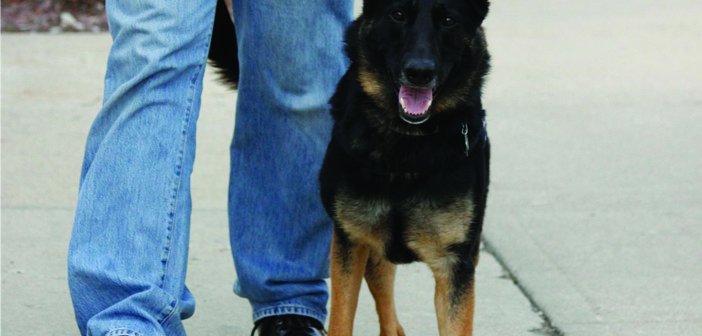Jennifer Flynn
Contributing Writer
Just a dog. To some people that is what they are, but for others a canine is so much more. Staff Sgt. Kevin Hanson is a 13-year veteran of the Marine Corps and suffers from Post Traumatic Stress Disorder (PTSD) and seizure disorder.
During several incidents over the course of his career, Staff Sgt. Hanson sustained multiple primary and secondary concussions, resulting in traumatic brain injury that over time caused him to develop seizures.
Most often the focus of traumatic brain injury is on a single incident. However, research shows that with each concussion lesions develop in the brain and over time can culminate in severe damage that can change personality and behavior.
A study from the 2014 issue of Journal of Neurotrauma states that “acute neurotrauma associated with sports related concussions in athletes and blast induced traumatic brain injury in soldiers elevates the risk for future development of chronic neurodegenerative diseases.”
Discharged from the Marine Corps and unable to feel safe in public due to PTSD-induced anxiety and seizures, Hanson became reclusive and unable to work. “I’ve had 17 jobs in five years,” he said.
Enter a dog. Just a dog. Grimm assists him in daily life as a service dog. She alerts him of an impending seizure up to 10 minutes prior to the event so he has time to sit safely and notify medical personnel.
Seizure-alert dogs can sense and notify their human companions of an oncoming seizure. This behavior can occur several seconds to 45 minutes before the onset of the seizure; it’s then a matter of marking the behavior with positive reinforcement.
“What we know on how dogs can alert to a seizure before it occurs is still a mystery. From a scientific standpoint, there is still so much that remains to be determined,” according to Dr. Basim Uthman, associate professor of neurology and neuroscience at the University of Florida College of Medicine and Brain Institute.
The dog does this by exhibiting marked changes in behavior, including close eye contact, circling, pawing, barking, etc. Grimm brings medication, water from the fridge and opens doors — both literally and figuratively.
Hanson’s hand has uncontrollable tremors when he drops something; however, Grimm often retrieves it for him. In crowds of people she makes him feel secure by her very presence and reassures him with a lick or nuzzle when she senses anxiety.
“She’s given me the ability to feel safe,” Hanson said. “She lessens my feelings that the world is out to harm me.”
Since her arrival, Hanson is reintegrating himself into the community — today they visited the post office. To most of us, a trip to the post office is a simple, mundane act we take for granted. For Hanson, it was an insurmountable task, until Grimm. To this Marine she is anything but just a dog.

